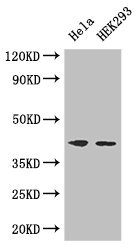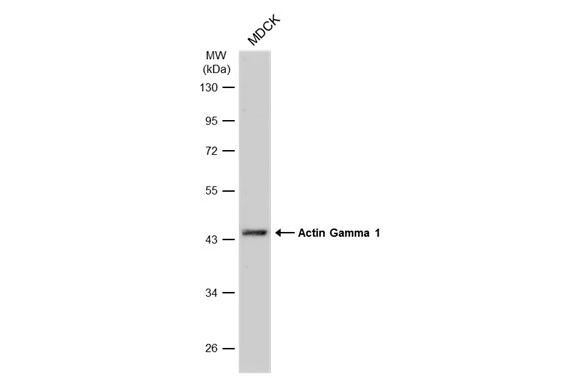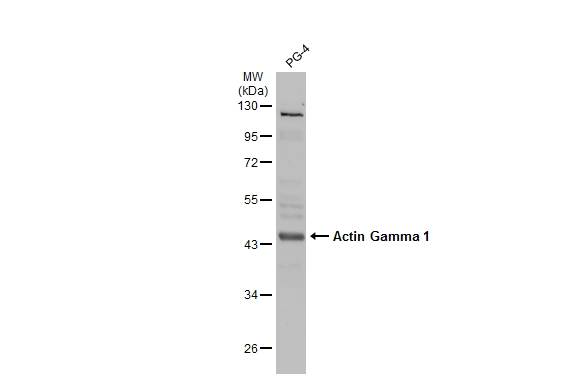![WB analysis of COS-7 cell lysate using GTX03493 Actin Gamma 1 antibody [2A3]. WB analysis of COS-7 cell lysate using GTX03493 Actin Gamma 1 antibody [2A3].](https://www.genetex.com/upload/website/prouct_img/normal/GTX03493/GTX03493_20220217_WB_3_w_23053123_559.webp)
WB analysis of COS-7 cell lysate using GTX03493 Actin Gamma 1 antibody [2A3].
Actin Gamma 1 antibody [2A3]
GTX03493
ApplicationsImmunoFluorescence, Western Blot, ImmunoCytoChemistry, ImmunoHistoChemistry, ImmunoHistoChemistry Paraffin
Product group Antibodies
ReactivityHuman, Monkey, Mouse, Rat
TargetACTG1
Overview
- SupplierGeneTex
- Product NameActin Gamma 1 antibody [2A3]
- Delivery Days Customer9
- Application Supplier NoteWB: 1:100 - 1:1000. *Optimal dilutions/concentrations should be determined by the researcher.Not tested in other applications.
- ApplicationsImmunoFluorescence, Western Blot, ImmunoCytoChemistry, ImmunoHistoChemistry, ImmunoHistoChemistry Paraffin
- CertificationResearch Use Only
- ClonalityMonoclonal
- Clone ID2A3
- Concentration1 mg/ml
- ConjugateUnconjugated
- Gene ID71
- Target nameACTG1
- Target descriptionactin gamma 1
- Target synonymsACT, ACTG, DFNA20, DFNA26, HEL-176, actin, cytoplasmic 2, cytoskeletal gamma-actin, epididymis luminal protein 176
- HostMouse
- IsotypeIgG2b
- Protein IDP63261
- Protein NameActin, cytoplasmic 2
- Scientific DescriptionActins are highly conserved proteins that are involved in various types of cell motility and in maintenance of the cytoskeleton. Three main groups of actin isoforms have been identified in vertebrate animals: alpha, beta, and gamma. The alpha actins are found in muscle tissues and are a major constituent of the contractile apparatus. The beta and gamma actins co-exist in most cell types as components of the cytoskeleton and as mediators of internal cell motility. Actin gamma 1, encoded by this gene, is a cytoplasmic actin found in all cell types. Mutations in this gene are associated with DFNA20/26, a subtype of autosomal dominant non-syndromic sensorineural progressive hearing loss and also with Baraitser-Winter syndrome. Alternative splicing results in multiple transcript variants. [provided by RefSeq, Jul 2017]
- ReactivityHuman, Monkey, Mouse, Rat
- Storage Instruction-20°C or -80°C,2°C to 8°C
- UNSPSC12352203

![WB analysis of NIH3T3 cell lysate using GTX03493 Actin Gamma 1 antibody [2A3]. WB analysis of NIH3T3 cell lysate using GTX03493 Actin Gamma 1 antibody [2A3].](https://www.genetex.com/upload/website/prouct_img/normal/GTX03493/GTX03493_20220217_WB_1_w_23053123_270.webp)
![WB analysis of various sample lysates using GTX03493 Actin Gamma 1 antibody [2A3]. WB analysis of various sample lysates using GTX03493 Actin Gamma 1 antibody [2A3].](https://www.genetex.com/upload/website/prouct_img/normal/GTX03493/GTX03493_20220217_WB_2_w_23053123_725.webp)
![WB analysis of HeLa cell lysate using GTX03493 Actin Gamma 1 antibody [2A3]. WB analysis of HeLa cell lysate using GTX03493 Actin Gamma 1 antibody [2A3].](https://www.genetex.com/upload/website/prouct_img/normal/GTX03493/GTX03493_20220217_WB_w_23053123_913.webp)
![WB analysis of knockout HeLa and wild type HeLa (WT) whole cell lysates using GTX03493 Actin Gamma 1 antibody [2A3]. Panel B is an internal control. WB analysis of knockout HeLa and wild type HeLa (WT) whole cell lysates using GTX03493 Actin Gamma 1 antibody [2A3]. Panel B is an internal control.](https://www.genetex.com/upload/website/prouct_img/normal/GTX03493/GTX03493_20220217_WB_4_w_23053123_237.webp)




